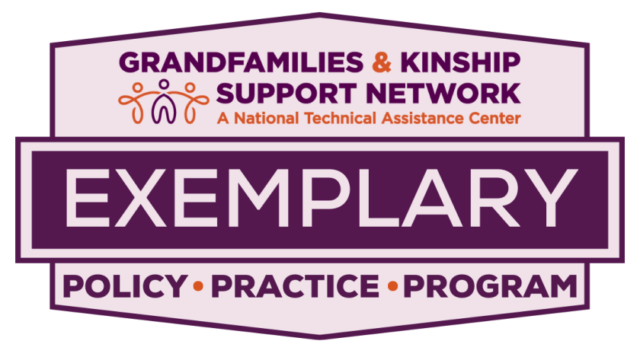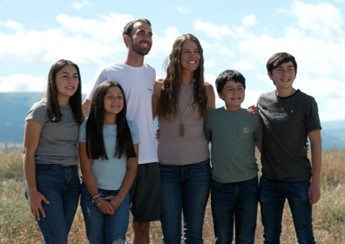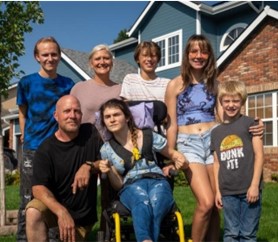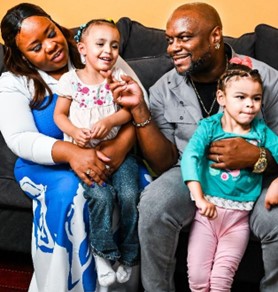Exemplary Programs
Colorado Kinnected – Colorado Department of Human Services
Download This Resource
Colorado Kinnected Kinship Navigator (Kinnected) is a county-administered, state-supervised program under the Colorado Department of Human Services. The mission of the program is to “strengthen the sustainable support community around children, youth, and their families” who are involved with the child welfare system. This mission is accomplished by drawing on the family and child’s existing connections to support the placement of children with kin caregivers. Program goals include efforts to reunify children with their parents and a whole-family approach to prevent the need for children to be involved with child welfare. If kin connections do not already exist, the model is designed to help build a support system.
Kinnected began as a pilot project expansion of the Title IV-E Waiver Demonstration Project Kinship Supports Intervention, which allowed more flexibility for states to use federal funds to test innovative approaches in child welfare service delivery. Building on outcomes showing that supported kinship placements deliver improved safety, permanency, and wellbeing, the model is designed to formally integrate kinship supports into child welfare and facilitate family engagement and family search and engagement practices. The Title IV-E Prevention Services Clearinghouse gave the program a “supported” practice rating in March 2024, following a December 2022 rating of “promising.” Due to its inclusion in the Clearinghouse, the State receives federal reimbursement of 50% of related expenses for each county that implements Kinnected. The program is currently in the process of a state-wide expansion to support any counties outside of the pilot that would like to implement the model. The Grandfamilies & Kinship Support Network is thrilled to designate this program as exemplary due to its county-specific tailored services, proven research as evidenced by their “supported” rating in the Clearinghouse, and commitment toward state-wide expansion.
Eligibility for Services and Intake
Kinnected serves children and families who are entering a new kinship placement with the formal involvement of the child welfare system or as part of a safety plan. In the event a child is already in the care of a relative prior to a child welfare case opening, Kinnected will begin working with the family when the case is officially open.
Each county handles the process of notifying the program of a kinship placement differently; some counties have a database they can access to see kinship placements in their county, others have a Placement Notification Form that child welfare staff members provide to the kinship program.
Once a child’s placement with a kin caregiver is established, a Kinnected staff member completes the Kinship Support Needs Assessment form with the caregiver, either over the phone or in person, within 7 to 30 days. The tool is comprehensive and includes every domain the program can be audited on, including background, family composition, urgent and ongoing needs, support system, parenting skills, grief and loss, educational or mental health needs of the child, and permanency plan. Kinnected staff members use the tool to rank the caregiver’s needs on a scale of 1 (no need) to 5 (urgent need) in each domain.
Service Population
Colorado is a county-administered state, meaning each individual county administers their own human services with oversight from the state. The pilot was conducted in 7 counties and included 402 children placed in 280 kinship families. The racial breakdown of children involved in the pilot closely mirrors state-wide demographics of children in child welfare placed with kin: 45% of children in the pilot were Hispanic, 40% were white, and 12% were African American.

Following the rating of “promising” in the Title IV-E Prevention Services Clearinghouse, more counties were able to begin implementing the model to draw down federal title IV-E funding. In addition to the seven counties that participated in the pilot, four counties have fully implemented the Kinnected model as of February 2024, and more counties are in the process of developing an implementation plan. Other counties have expressed interest in implementing the program, and the state has provided them with information and support.
Services
Kinship Services
The primary service of the Kinnected program is support for kin caregivers. At the time of placement, each family is assigned a kinship caseworker from their county who provides emotional and tangible support. This intervention includes a kinship support needs assessment followed by corresponding services and supports. Although they vary from county to county, examples of concrete goods and services provided include food, clothing, cribs, and car seats; utility or rent assistance; mental health services; funds for children’s activities or extracurricular fees; and support groups. This level of service is ongoing throughout the duration of the child welfare case.
Our kinship worker is truly there for our interests. [She] will have an honest conversation and advocate for us.
Kin Caregiver
Facilitated Family Engagement
Kinnected also uses Facilitated Family Engagement (FFE), a practice that allows caseworkers to collaborate with a child’s family to create goals and support for well-being and safety. These meetings are collaborative and include both identified family members and professionals. FFE requires the use of a genogram and the family involvement continuum to help identify connections and then facilitate conversations with those connections. Meetings are held throughout the entire time a child is in a kinship home and may include other identified kin, teachers, or therapists.
Family Search and Engagement
Kinnected relies on Family Search and Engagement strategies to identify, locate, and engage kin when a child enters the child welfare system. This approach requires the use of a genogram to help identify familial connections and facilitate conversations with those connections. In this way, it helps locate permanent relative homes for children or identify relatives who can provide ongoing support to the youth. Strategies used include interviewing the youth and parent to identify important connections; using search engines, databases, or social media; and reaching out to emergency school contacts.

Staff
Kinnected’s program support is headed by a kinship care program administrator employed by the Colorado Department of Human Services and is closely connected to an evaluation team from Colorado State University and Human Services Research Institute (HSRI).
To implement Kinnected, each county is responsible for its own staff. The model is designed to utilize already existing staff. The team size and roles vary greatly depending on county size and needs, but they generally include a manager/ administrator, kinship supervisor(s), and a team of one or more kinship navigators.
Key Partners
Partners vary widely from county to county. Notable Kinnected partners include but are not limited to:
- Adult and Aging Services– provides services to kinship caregivers through the National Family Caregiver Support Program (NFCSP).
- Aging and Disability Resources for Colorado – provides grants for home repairs for people over 60.
- Care Portal – Network of churches that provide concrete goods when a need arises.
- Catholic Charities Denver – offers support groups, family events, support, training, and resource referrals.
- Colorado Works – Colorado’s Temporary Assistance for Needy Families office.
- Easter Seals Colorado – works with families and children with disabilities.
- Family Tree – holds a contract with two metro counties in Colorado to provide services to kinship families.
- Foster Connections – provides goods and services to kinship families.
- Foster Source – nonprofit that provides support groups, learning classes, and respite for kin caregivers.
- GrandFamily Coalition – nonprofit that builds support for kin caregivers by connecting caregivers to resources.
- One Simple Wish – nonprofit that grants wishes for children in foster care throughout the state.
A kin-serving community stakeholder coalition meets monthly. This provides an opportunity for partners to connect, share ideas, and receive updates on initiatives.
Caregiver Engagement
Caregiver engagement is an important aspect of Kinnected. Caregivers in the pilot program were surveyed as a part of the research and evaluation. Caregivers note that they feel supported by their kinship caseworker and receive ongoing support and resources. Caregivers share that the most helpful assistance is items such as back-to-school supplies, gift cards, cribs, diapers, and car seats.
The biggest challenge caregivers expressed about the program is that it is embedded in the Human Services system. Because of this, there are policies and bureaucracies that their workers are not able to change, which sometimes feel like a barrier to the families.

Outreach
Outreach to families is minimal, because Kinnected is embedded in child welfare and every kinship case starts with a referral from child welfare.
A unique component of outreach is educating foster care and adoption caseworkers. Kinnected does this in a variety of ways, such as through a video created by Denver County to be used as core training for all caseworkers and a “walk-through” simulation event that helps foster care caseworkers understand the whole environment of a home or family system and look beyond background checks when determining placement.
Funding and Sustainability
Kinnected has sustainable funding through federal Title IV-E Prevention Services funding. The program was rated as “promising” by the Clearinghouse in 2022, enabling ongoing 50% reimbursement of all program costs. This new funding is not capped, so as costs rise, so does the reimbursement. Moreover, it is what is known as entitlement funding, so it is new money that does not draw away from other uses of this funding source. This funding will continue with the higher “supported” rating earned in March 2024.
Demonstrating Success and Continuing Quality Improvement
Kinnected partnered with a team from Colorado State University and HSRI for a robust research and evaluation project that was submitted to the Title IV-E Prevention Services Clearinghouse in May 2022. The pilot included kinship families caring for children or youth of any age with an open child welfare case. The research included 402 children, divided into a control group and an intervention group. The intervention group received services offered by Kinnected and each caregiver was assigned a kinship caseworker to deliver services as outlined in the manual. Data was reviewed monthly and technical assistance was provided to the pilot sites to ensure fidelity to the model. Supervisors of pilot sites also had access to the data so they could routinely review their data and ensure staff were maintaining fidelity to the model. An impact study was released in 2022, and an updated version outlining results six months post services was released in 2023.
Challenges and Areas for Program Improvement and Growth
Program staff note challenges surrounding funding for concrete goods. Various counties experience this differently, as more populated counties have more resources than rural counties. Counties are innovative in securing concrete goods for caregivers as they are first starting their programming, and each recognizes that this funding difficulty will ease once they fully implement the Kinnected model and are able to draw down IV-E funding.
The program is currently experiencing major growth as counties choose to implement the Kinnected model. At an implementation “kick off” event in September 2023, counties state-wide came together for a day-long symposium at which the model was presented and program staff heard from caregivers and had the opportunity to dialogue about county-specific questions regarding implementation.
Lessons Learned
Direct service staff emphasize the importance of having patience. They note that they often come against “bumps” with caregivers with regard to requirements, such as filling out lengthy surveys as a part of the pilot program, whose larger purpose may not be clear to the caregiver. They emphasize that taking time to explain the purpose of paperwork and surveys is helpful but would also advise keeping these additional requirements as concise as possible.
Other staff and partners stress the need to have good relationships between staff and caregivers. They suggest building rapport first, then building the support services from there.
Additional Program Resources
- Colorado Kinnected Kinship Manual for Clearinghouse
- Impact Study of the Colorado Kinnected Kinship Navigator Program – March 2022
- Impact Study of the Colorado Kinnected Kinship Navigator Program Foster and Congregate Care Entry Rates at Six Months Post Treatment – November 2023
Learn More about the Network’s Exemplary Designation
Network staff, along with staff of a partner organization, participated in a site visit to this program and are available to answer questions based on this summary. Please complete this short form and we will get back to you.
For information about the steps and criteria of the exemplary designation process, please click here.
